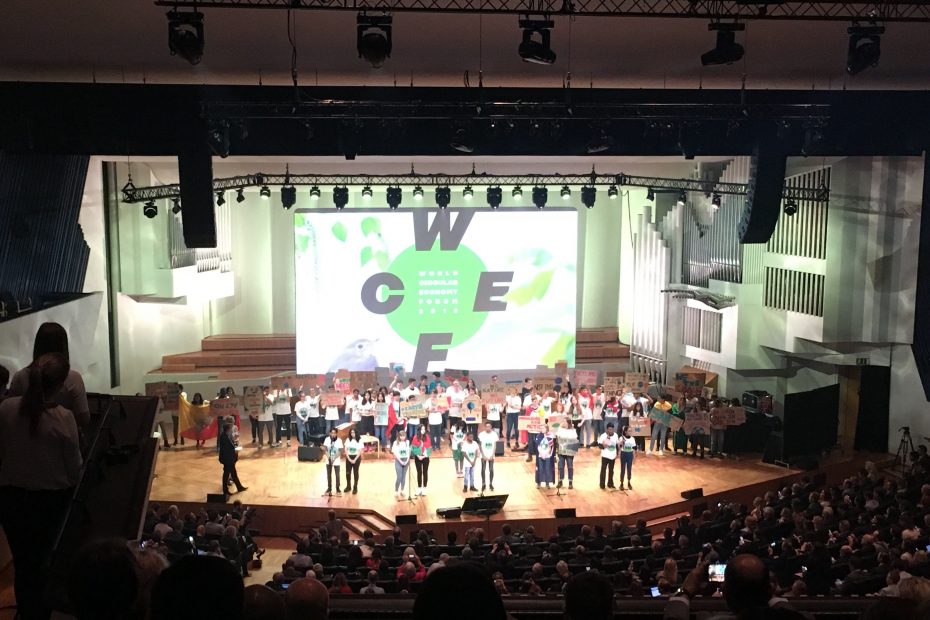World Circular Economy Forum 2019 – reflections
The World Circular Economy Forum (WCEF 2019) took place in Helsinki in June this year, organised by SITRA, the Finnish Innovation Fund. It was the third time this event was held and, with 2,200 delegates attending, there is clearly a growing interest in the subject.
Key themes at the Forum were: the system is broken and needs to be replaced, how to scale the circular economy (CE) in a global context, the importance of ethical and fair approaches, and the role of developed economies to avert the climate crisis.
In summary, parallel sessions, side events, side sessions took place throughout the two days of the Forum on cities, governance, Africa, plastics, construction, metrics, investment, water and carbon. And yet, CE continues to be considered a developed country opportunity. That said, more voices are beginning to be heard from emerging economies. In addition, with the climate crisis climbing up the policy and business agenda, there is now a greater interest in how the circular economy can help solve social and environmental challenges.
The circular economy is a global topic with multi-stakeholder engagement
Delegates from a wide range of countries representing policy makers, businesses, think tanks, academia and civil society attended the Forum. Not surprisingly speakers highlighted that collaboration was essential but were not clear about how this was going to happen. My experience at conferences is that fine words are said but evidence of follow-up and accountability is hard to find. I have already started to contact the people I met who were enthusiastic about partnering on areas of common interest and will continue to seek actions from them. The United Nations Sustainable Development Goals featured throughout WCEF 2019, so delegates could see how initiatives fit into several goals and targets.
Circular innovation continues apace in emerging economies
Many case studies and innovative circular business models were presented from the Global North e.g.: Olio, Peerby, Philips, Carbo Culture, Fjong, Reima Play and Evrnu. In addition, there were two sessions which focussed on Africa. Session on ‘The Circular Economy in Africa’ was led by the Minister of the Environment of Rwandan and the African Development Bank who told the audience that, of the 10 countries considered most vulnerable to climate change, seven are in Africa. WCEF 2019 highlighted several circular economy and Green Growth case studies:

Many case studies and innovative circular business models were presented from the Global North e.g.: Olio, Peerby, Philips, Carbo Culture, Fjong, Reima Play and Evrnu. In addition, there were two sessions which focussed on Africa. Session on ‘The Circular Economy in Africa’ was led by the Minister of the Environment of Rwandan and the African Development Bank who told the audience that, of the 10 countries considered most vulnerable to climate change, seven are in Africa. WCEF 2019 highlighted several circular economy and Green Growth case studies:
- Using fish leather in Kenya to make shoes and bags
- Green Ventures in Tanzania, set up by Edgar Edmund when he was 15 years old, making building materials from plastic waste
- Sanergy helping to solve sanitation issues in urban slums in Kenya
- Angaza in Rwanda which upcycles discarded advertising banners into everyday accessories
- South Africa Department of Science and Technology – National Waste Research, Development and Innovation Roadmap
As a result, these case studies build on the circular knowledge and practice that already exists in the emerging. We see this from recent publications:
- My blog: ‘Circular Economy in Africa – an opportunity to leapfrog?’
- Case studies from Africa that are being curated by the RSA International Development Network and the African Circular Economy Network as part of the planning for a Pan-African Circular Economy Conference in 2021.
- ‘The Circular Economy and the Global South’ book, published in 2019, in which I co-wrote the chapter ‘Accelerating the transition to a circular economy – case studies from Kenya and South Africa’ highlights green growth policies that are being developed and circular entrepreneurs entering the marketplace.
Measuring circularity
Measuring the extent of circularity in product and city initiatives is becoming a popular research area as well as how we are progressing to become a circular world in social as well as economic and environmental terms. The Forum heard about the work that Kate Raworth and Circle Economy are doing with the City Council to create a ‘City Doughnut’ for Amsterdam. Kate’s Doughnut Economics is a framework that to ensure that no one falls short on life’s essentials (from food and housing to healthcare and political voice) while ensuring that collectively we do not overshoot our pressure on Earth’s life-supporting systems (stable climate, fertile soils, and a protective ozone layer). This initiative will focus on three priority value chains: biomass and food, construction, and consumer goods.
However, devising metrics for circularity continues to be a challenge, particularly in cities. Ideas are starting to emerge such as the Eurostat framework. Circle Economy has also published a Circularity Gap Report which measures materials flowing through and in long-term use by the economy. Unfortunately, the calculations suggest that our world is only 9.1% circular (cycled resources divided by total resources entering the economy in 2015) and the trend is negative meaning that the circularity gap is not closing.
Furthermore, new measurement approaches are needed to ascertain whether we are moving in the right direction. Some speakers at WCEF 2019 admitted that we currently don’t have much knowledge and innovative research is required into the benefit of material passports, technical solutions such as blockchain and data sharing platforms which are transparent.
Bioeconomy solutions to the plastic problem
Finally, one session I was keen to attend was entitled ‘Plastics and a circular bioeconomy’. The speaker line-up looked promising and I was hoping to hear about major innovations in the design of new materials for packaging. However, it was only in the final slides from the last speaker that an exciting new development was presented: plant-based nanocellulose film that VTT has developed for the packaging industry. There is hope but we need more new materials like this and soon. Catherine’s blog on sustainable packaging has shown the key issues and circular approaches. The BBC programme ‘War on Plastics with Hugh and Anita’ highlighted the role that large corporates have to play in solving the problem they created as well as the part that individuals can play through behavioural change, citizen lobbying and using their purchasing powers.
WCEF 2019 conclusions and looking ahead to WCEF 2020 in Canada
My overall conclusion was that WCEF 2019 is the ‘must-go-to’ conference for circular economy professionals. However, like many conferences I have been to, there were fine words and promises of action from speakers which are not always followed up. To this end, I suggested to the organisers of WCEF2020 (Canada) that more group work, learning from each other and more stories from the Global South would facilitate commitment to collaborative action. Fingers crossed!
Recordings of the sessions are available online at the WCEF2019 website.
